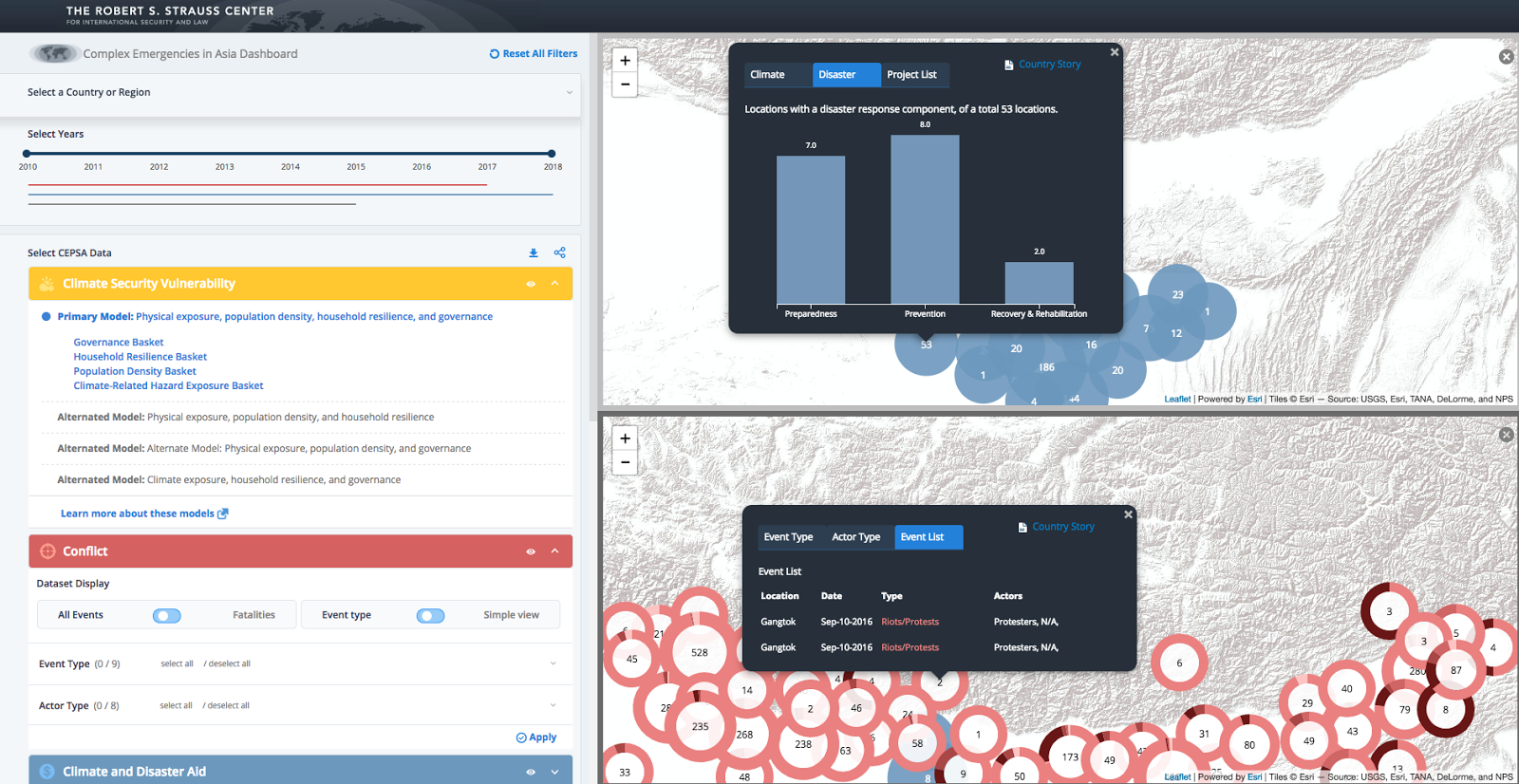Visualizing the Interdependencies between Conflict, Climate Change, and Natural Disasters
How do conflict, climate change, and natural disasters overlap — and how can policymakers mitigate these challenges? The Complex Emergencies and Political Stability in Asia (CEPSA) program is a 3 year project funded by the US Department of Defense that explores the interdependencies of these issues and their impact on Asia. Most importantly, CEPSA also seeks to provide potential strategies to mitigate these challenges. CEPSA is a collaborative research program led by the Robert Strauss Center at the University of Texas-Austin; the Armed Conflict Location and Event Data project; Development Gateway; and the University of California-Berkeley.
One of CEPSA’s core outputs is the Complex Emergencies Dashboard, a public, online geospatial mapping tool designed to visualize trends in disaster vulnerability, climate security, conflict, governance and disaster aid in Asia. The dashboard displays CEPSA-produced datasets for 11 countries in South and Southeast Asia — allowing policymakers, researchers, and NGOs to visualize areas of insecurity overlap. In doing so, these audiences can both prepare for and effectively design responses to complex emergencies.

For example, users can examine the current distribution of climate and disaster aid in Bangladesh against areas most vulnerable to disaster. The dashboard also allows users to overlay externally-created geospatial data on terrorism, piracy, etc.
A key goal of the Complex Emergencies Dashboard is to help local and national governments identify communities in need of resilience-related investments. By overlaying information — such as the number of disaster response trainings taking place across India against areas of climate change vulnerability — decision makers better understand whether resource gaps exist, and which interventions would best support resilience building.
Conflict, disasters, and climate change are interdependent challenges across both Asia and the world. We believe that being able to more easily visualize and understand this interplay is an important step for policymakers towards developing holistic action plans and sustainable solutions. The Complex Emergencies Dashboard will be publicly available online in Fall 2017. Until then, be sure to check back for more updates.
Share This Post
Related from our library

Beyond Kigali: Where Does Africa Go from Here with AI?
As governments, funders, entrepreneurs, and technology leaders rally around the AI moment and move towards actions, at Development Gateway, we are asking a different set of questions: Where is the data, and what is the quality of the data behind the algorithms? How will legacy government systems feed AI tools with fresh and usable data? Are Government ministries resourced to govern and trust the AI tools that they are being encouraged to adopt?

The Data Crisis Following USAID’s Withdrawal: Opportunities to Reimagine Data Systems
For decades, USAID and other US government funding supported global data systems, from health surveys and early warning tools to digital infrastructure for ministries. The abrupt termination of USAID funding has triggered twin crises: a halt to data collection and the undermining of digital systems – reveal existing inefficiencies and instabilities in how data is collected, managed, and shared both within and between countries.

Building a Sustainable Cashew Sector in West Africa Through Data and Collaboration
Cashew-IN project came to an end in August 2024 after four years of working with government agencies, producers, traders, processors, and development partners in the five implementing countries to co-create an online tool aimed to inform, support, promote, and strengthen Africa’s cashew industry. This blog outlines some of the key project highlights, including some of the challenges we faced, lessons learned, success stories, and identified opportunities for a more competitive cashew sector in West Africa.